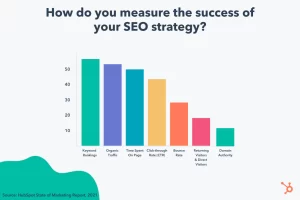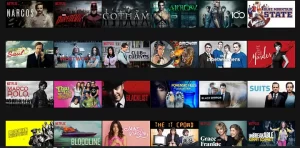Search engine optimization (SEO) is crucial for businesses seeking to increase their online presence and attract organic traffic in the constantly evolving digital landscape.
In order to achieve higher rankings on search engine results pages (SERPs), marketers are always looking for novel methods to optimize their websites and content. According to a report by HubSpot, 61% of marketers consider increasing SEO and expanding their organic presence to be their top inbound marketing priority.

The emergence of artificial intelligence (AI) technologies has provided marketers with an invaluable partner to revolutionize their SEO efforts and outperform the competition. In this article, we will examine how AI can be utilized to enhance SEO strategies.
Advanced Keyword Research: Unlocking Insights for Precise Targeting
Effective keyword research is the foundation of effective SEO. AI-powered solutions have emerged as game changers, allowing marketers to delve deeper into data and extract useful information on search patterns, user intent, and competition.
Uber, the worldwide ride-sharing behemoth, relies on SEO to interact with prospective riders and drivers. Uber uses AI-powered techniques to improve keyword targeting and stay ahead in the competitive ride-sharing sector.
Uber’s AI systems identified high-value long-tail keywords by evaluating massive volumes of search data, user queries, and regional patterns. As a result, they improved their website and app content to match these keywords, and within three months saw a 25% boost in organic traffic.
Content Creation and Optimization: Crafting Engaging Content at Scale
AI has transformed content creation and optimization, allowing marketers to create high-quality, engaging, and SEO-friendly content at scale. AI technologies can scan existing material, identify gaps, and recommend related subjects, headings, and keywords to improve search exposure.
NLP algorithms can assist marketers in creating appealing meta descriptions, titles, and snippets that increase click-through rates. AI can also help with content performance monitoring, user interaction analysis, and data-driven recommendations for content improvement.
HubSpot, a prominent inbound marketing and sales platform, used AI-generated content to increase organic traffic and improve content marketing efforts.
HubSpot assessed the performance of its existing blog posts and discovered areas for improvement using AI-powered content optimization tools. To improve search exposure, the AI algorithms suggested relevant topics, headlines, and meta descriptions. HubSpot observed a 20% increase in organic traffic and a 15% increase in blog engagement after implementing these AI-driven recommendations.
You can read more here about how HubSpot users are using AI to enhance their content.
Voice Search Optimization: Embracing the Voice-Activated Future
The growing prevalence of voice assistants and smart devices has revolutionized the way people search for information online. Every month, about 1 billion voice searches are conducted. More than half of adults say they use voice search daily. As of 2023, 27% of smartphone users use voice search. Featured snippets account for more than 40% of the voice search results.
In the fast-developing industry of voice-activated gadgets and AI assistants, Domino’s Pizza recognized the value of voice search. Domino’s enhanced its website and app content with AI to attract a higher share of voice search traffic.

Domino’s AI algorithms recognized common voice search phrases relevant to their products and services by monitoring conversational language trends and consumer requests. The text was then adjusted to offer natural language answers to frequently asked questions. As a result, Domino’s website traffic from voice search searches increased by 30%.
Marketers can improve their chances of showing in voice search results by using long-tail keywords and answering frequently asked questions. Voice search optimization not only improves SEO but also assists marketers in catering to the growing number of voice-enabled device users and improving overall user experience.
Enhanced User Experience: Delighting Users and Search Engines Alike
AI can improve SEO-critical user experience (UX). AI-powered chatbots and virtual assistants can respond to customer queries instantly and personally, strengthening customer satisfaction. Machine learning algorithms assess user behaviour, preferences, and browsing habits to recommend content and improve website navigation. Optimizing website load times, mobile responsiveness, and UX can boost user satisfaction, bounce rates, and organic visibility.
Netflix, the world’s largest streaming service, uses AI to improve user experience. Netflix leverages AI to monitor user behaviour, viewing habits, and content consumption trends to make personalized content recommendations.

This data-driven approach reduced customer attrition by 15% and increased session duration by 20%. Netflix’s AI-enhanced UX boosts SEO by increasing user satisfaction and engagement. Netflix saves $1 billion per year with AI.
Summary
Real-world case studies demonstrate how AI can revolutionize SEO efforts. Marketers can position themselves for success and remain ahead of the competition in the dynamic world of SEO by leveraging the power of AI.
Marketers get a competitive advantage, higher organic ranks, and qualified visitors to their websites by integrating AI-powered solutions for keyword research, content production, voice search optimization, and enhanced user experience.
